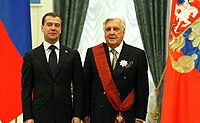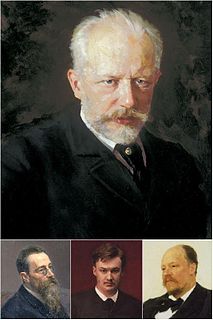This page is based on this
Wikipedia article Text is available under the
CC BY-SA 4.0 license; additional terms may apply.
Images, videos and audio are available under their respective licenses.

Ilya Glazunov was a Russian artist from Saint Petersburg. He was the founder of the Russian Academy of Painting, Sculpture and Architecture in Moscow where he also served as a rector up until his death. He held the title of People's Artist of Russia.
The Symphony No. 4 in E flat major, Op. 48, was written by Alexander Glazunov in 1893. The symphony was a departure from Glazunov's three earlier symphonies, which were based on nationalistic Russian tunes and, according to the composer, allowed him to give "personal, free, and subjective impressions of myself."
The Symphony No. 5 in B-flat major, Op. 55, was written by Alexander Glazunov from April to October 1895. Although in this symphony Glazunov returned to his conventional four-movement layout he frequently utilizes thematic transformation. Glazunov described it as "silenced sounds" and "an architectural poem".

Mitrofan Petrovich Belyayev was an Imperial Russian music publisher, outstanding philanthropist, and the owner of a large wood dealership enterprise in Russia. He was also the founder of the Belyayev circle, a society of musicians in Russia whose members included Nikolai Rimsky-Korsakov, Alexander Glazunov and Anatoly Lyadov. His surname is often transliterated as Belaieff or Belayev. In 1886 the important Russian painter Ilya Repin made a portrait of Belyayev.
Alexander Glazunov wrote his Symphony No. 1 in E major, Op. 5, in 1881, when he was 16 years old. It was premiered the following year in St. Petersburg. It is known as his Slavonian Symphony.
Alexander Vyacheslavovich Ossovsky was a renowned Russian musical writer, critic and musicologist, professor at Saint Petersburg Conservatory, pupil of Nikolai Rimsky-Korsakov, and friend of Sergei Rachmaninoff, Alexander Siloti and Nikolai Tcherepnin.
The Symphony No. 7 in F major, Pastoral, Op. 77, was completed by Alexander Glazunov on July 4, 1902. It is dedicated to Mitrofan Belyayev.

Alexander Borodin's Scherzo in A-flat major is a lively piece written in 1885, while Borodin was in Belgium for an early performance of his then incomplete opera Prince Igor. It was originally written for solo piano but in 1889 Alexander Glazunov orchestrated it, along with the Petite Suite. Borodin dedicated the piece to Théodore Jadoul, who made a four-hand piano arrangement of it.

Pyotr Ilyich Tchaikovsky's relations with the group of composers known as the Belyayev circle, which lasted from 1887 until Tchaikovsky's death in 1893, influenced all of their music and briefly helped shape the next generation of Russian composers. This group was named after timber merchant Mitrofan Belyayev, an amateur musician who became an influential music patron and publisher after he had taken an interest in Alexander Glazunov's work. By 1887, Tchaikovsky was firmly established as one of the leading composers in Russia. A favorite of Tsar Alexander III, he was widely regarded as a national treasure. He was in demand as a guest conductor in Russia and Western Europe, and in 1890 visited the United States in the same capacity. By contrast, the fortunes of the nationalistic group of composers known as The Five, which preceded the Belyayev circle, had waned, and the group had long since dispersed; of its members, only Nikolai Rimsky-Korsakov remained fully active as a composer. Now a professor of musical composition and orchestration at the Saint Petersburg Conservatory, Rimsky-Korsakov had become a firm believer in the Western-based compositional training that had been once frowned upon by the group.
The year 1957 was marked by many events that left an imprint on the history of Soviet and Russian fine arts.

Vasili Afanasyevich Glazunov was a Soviet lieutenant general, who was the first commander of the Soviet airborne (VDV). He was twice awarded the Hero of the Soviet Union.
Rimsky-Korsakov is a 1953 Soviet biopic directed by Gennadi Kazansky and Grigori Roshal and starring Grigori Belov, Nikolai Cherkasov and Aleksandr Borisov. The film portrays the life of the Russian composer Nikolai Rimsky-Korsakov. The film was shot in Sovcolor.

Viktor Ivanovich Khokhryakov was a Soviet Russian film actor, theater actor and director. He played the composer Alexander Glazunov in the 1954 film Rimsky-Korsakov.

First National Art Exhibition "Soviet Russia" was one of the largest Soviet art exhibitions of the 1960s. The exhibition took place in Manezh Exhibition Hall.

Commemorative Cantata for the Centenary of the Birth of Pushkin, Op. 65, is a cantata by Alexander Glazunov, composed in 1899 in memory of author Alexander Pushkin. It is also known as Memorial Cantata and Cantata in Memory of Pushkin's 100th Birthday. The work in five movements on lyrics by Konstantin Romanov is scored for solo voices, choir and piano.
The 3rd Airborne Corps was an airborne corps of the Red Army in World War II. The corps was established near Kiev.









